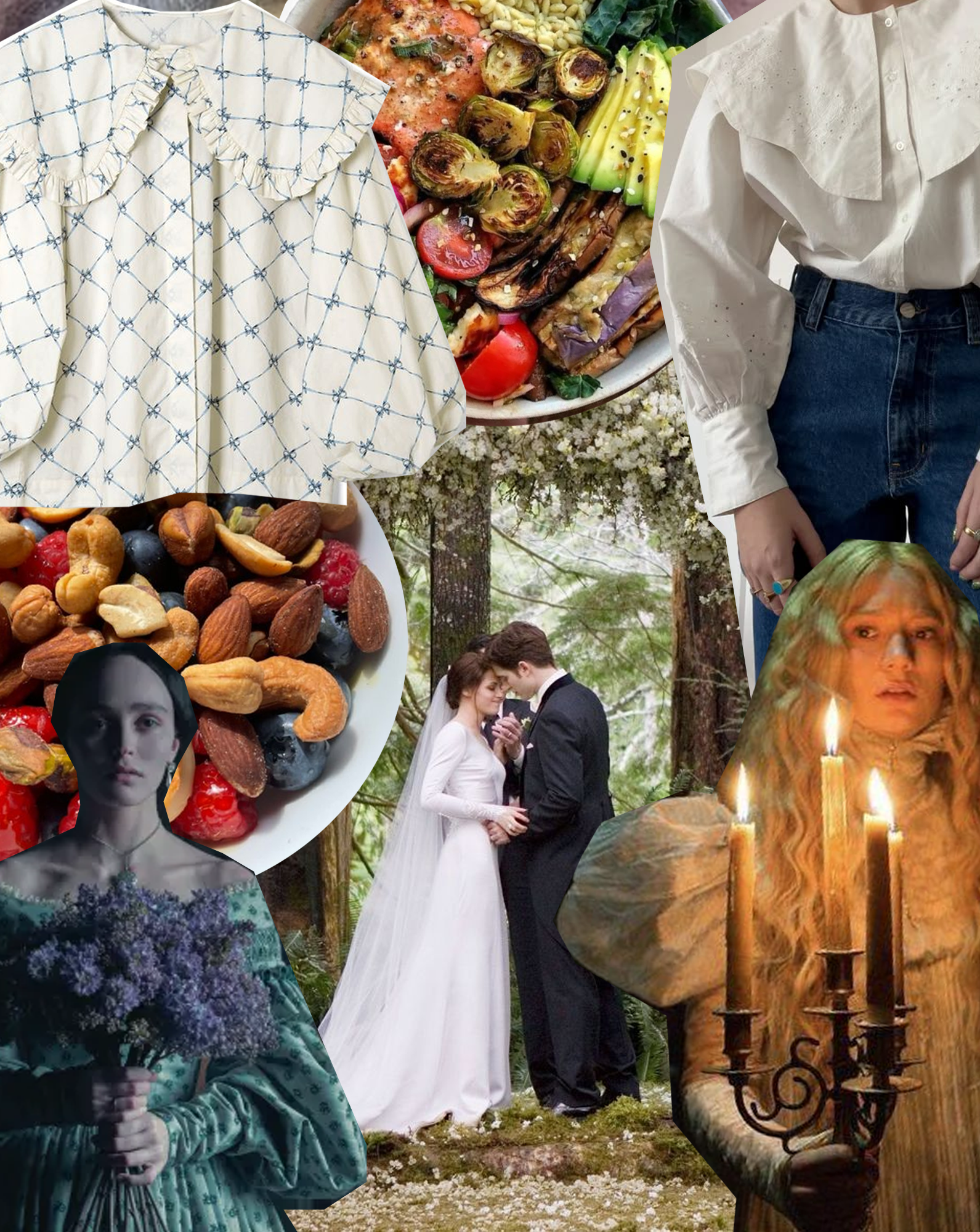Buttoned up to the TOP: How Gen Z are Turning to Puritanism
Words: Mia Autumn Roe
From the corpse of Brat summer is born a balloon skirted, Damson Madder collared young lady; fresh from her morning shed routine and ready to prepare her healthy date butter dessert from scratch. Online, she shares disdain for the alt right Andrew Tate keyboard warriors spouting praise for Trump and looksmaxxing; she wonders how the promise of her generation has keeled over and died. Well, let me hold your hand when I tell you this diva, it links to you putting “getting married young” on your ‘in’ list for 2025.
The pandemic did a number on young people in a number of ways, but the most heavily reported on was its effect on their supposed “prudishness”. Less interested in clubbing claimed a July 2022 survey, named sex-averse by the Kinsey Institute in 2021, and more interested in purified hobbies such as running, reading and crafts adds the BBC. It’s clear that our shift away from crusty club floors, raunch and sleaze has emerged from the depravity of the cost of living crisis. While an economical lifestyle has infiltrated our interests, politics and sexual fantasies, a romantic view of conservatism has followed in gen z cultural spaces. We’re obsessed with puritanism, or more specifically, self control.
Now don’t get me wrong, I’m not saying that all of gen z is heading for the alt right. As a generation, we remain the most accepting of race, sexuality and neurodivergences, our prioritisation of mental health is pioneering and our rejection of middle management positions is really forcing the working world to re-evaluate how to engage with us. Yet, where some of us have one foot in the incel, crypto-currency political trench, the rest have been seduced by trad wives; ‘looking for men in finance’ and conservatism is bleeding in through the powers of aesthetic. It emerges in statistics too, with more than half calling for the UK to become a dictatorship. Corseted in Victoriana and nostalgic yearning, a ‘trad’ way of thinking has become a more appealing way of onboarding young people into the Conservative pipeline.
___STEADY_PAYWALL___
“We’ve rebranded #selfcare and converted ourselves into pixel-perfect deities. Our pursuit for absolute individuality and peak morality has become devout.”
Nothing has pinned this desire towards temperance finer than Robert Egger’s Nosferatu, which released this year. Gothically Victorian, monstrous and horny, the girlies loved it and looped it into the “Perverts winter” brought on by Ethel Cain’s latest album. What became sexy was no longer sex itself, but the illegality of it, the yearning for it, the self-restraint and contrast between perfection and sin. In such films as Nosferatu, it’s also interesting to see the generational obsession with monogamy play out in full force. While polyamory and open relationships are at an all-time high, a large majority of Gen Z embrace that monogamy is their primary sexual fantasy. The TikTok fancams and tweets pining for Bill Skarsgård literally rotting monster corpse were of course met with backlash from people claiming they ‘didn’t get the film’, but ultimately, Egger’s placement of Ellen’s desire within either her husband, Thomas or the desire hungry Count Orlok, magnifies the drama of Ellen needing to choose one vessel in which to place all her love and sexuality. It pines for a singular companion who is romantic and all-consuming, and we ate it up. Even the necrophilia.
The craving for self-restriction extended online into the proportion of diets and “healthy lifestyles”. Influxes of teenagers have taken on 75 Hard fitness challenge, while those with a working salary are signing up to No Buy Years. The de-influencing and underconsumption trends have asked us to reflect on what we truly need, but have also encouraged us to think that an urge to want something simply out of desire must be cleansed. Doubling back on itself, the Ozempic face of 2025 reflects the waifbaby of the 90s - this proliferation of an emaciated look adds fuel to our ambition towards looking delicate and pure. Reacting to dying economies in the same way our grandparents adopted post-war frugality, our eagerness to showcase our self-limitation only emphasises the positioning of restriction alongside morality.
What has also played a contributing factor in this lean towards a more traditionalist thinking, is the rampant corporatisation of liberalism. Our phone screens are awash with progressive slogans from big brands, while our cinemas are coated in oversaturated feminism and eat the rich black comedies. The authenticity of this mass produced social liberalism feels unreliable and our rejection of it feels like the correct response towards capitalist spearheads approaching the “woke agenda” simply to strengthen their stability.
Another place this overcompensation of liberalism takes place is within social media online activism. Though brilliantly effective in spreading word and awareness, examples such as the LA fire reposts and “winter boots” TikTok trend can sometimes feel derivative from a religious pursuit of ultimate and competitive goodness. It’s cynical but the underlying effect is competitive: Who can be the best at being the most moral, most politically correct, most put together. Our acts of social duty only hold value if they’re witnessed, liked and recognised.
Though today, many of us no longer seek out affirmation from a God, this proof of morality is not for a higher being, but for us and each other. We’ve rebranded #selfcare and converted ourselves into pixel-perfect deities. Our pursuit for absolute individuality and peak morality has become devout.
Until the election win for Trump, this slow segway into puritan aestheticism and traditional romanticism was arguably harmless, but as it now appears to contribute to a wider shift into our society’s prospects and our generations future belief system, we may need to scale back on the nostalgic yearning.


